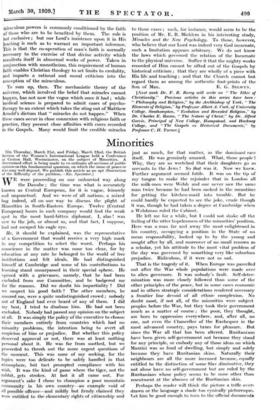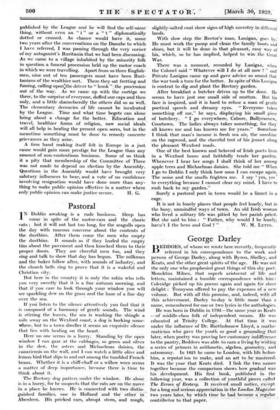Minorities
[On Thursday, March 2Ist, and Friday, March 22nd, the British Section of the. Women's International League held a Conference at Caxton Hall, Westminster, on the subject of Minorities. A determined effort is being made to co-ordinate all sections of public opinion on this fundamental question, on which the issue of peace or war may well depend. We publish this article as an apt illustration of the difficulty of the problem.—ED. Spectator.] lATE were proceeding on our unhurried way along the Danube ; the time was what is accurately known as Central European, for it is vague, leisurely and unpunctual. And we were of all nations, a mixed bag indeed, all on our way to discuss the plight of Minorities in South-Eastern Europe. Twelve (Central European) hours in such company would find the weak spot in the most hard-bitten diplomat. I, alas ! was new to the job, or almost so, and that fact, I suppose, had not escaped his eagle eye.
He, it should be explained, was the representative of a Government that would receive a very high mark in any competition to select the worst. Perhaps his conscience in the matter was none too clear, for by education at any rate he belonged to the world of free institutions and felt ideals. He had distinguished himself at Cambridge and some of his contributions to learning stand unsurpassed in their special sphere. He opened with a grievance, namely, that he had been excluded from our Committee, and he badgered me for the reasons. Did we doubt his impartiality ? Did we suspect his good faith ? The other members, he assured me, were a quite undistinguished crowd ; nobody out of England had ever heard of any of them. I did my best, I tried to disabuse him. He had not been excluded. Nobody had passed any opinion on the subject at all. It was simply the policy of the executive to choose their members entirely from countries which had no minority problems, the intention being to avert all suspicion of bias or prejudice. But whether this policy deserved approval or not, there was at least nothing personal about it. He was far from soothed, but we proceeded to thresh out the more urgent questions of the moment. This was none of my seeking, for the topics were too delicate to be safely handled in that atmosphere, but tact prompted compliance with his Wish. It was the kind of game where the tiger, not the rabbit, gets strokes. At last it all came out. For argument's sake I chose to champion a poor mountain community in his own country—an example void of all possible offence—and mildly but firmly claimed they were entitled to the elementary rights of citizenship and just as much, for that matter, as the dominant race itself. He was genuinely amazed. What, those people I Why, they are so wretched that their daughters go as servants to the Jews ! So that was it. Now we knew. Further argument seemed futile. It was on the tip of my tongue to make the rejoinder that in London all the milk-men were Welsh and one never saw the same man twice because he had been sacked in the meantime for' getting the kitchen-maid into trouble. But he could hardly be expected to see the joke, crude though it was, though he had taken a degree at Cambridge when a Welshman ruled the Cabinet.
He left me for a while, but I could not shake off the feeling of the utter hopelessness of the minorities' position.
Here was a man far and away the most enlightened in his country, occupying a position in the State of no mean responsibility, looked up to by the young and sought after by all, and moreover of no small renown as a scholar, yet his attitude to the most vital problem of the day was governed by something very like suburban prejudice. Ridiculous, if it were not so sad.
That is the tragedy of it. When Europe was parcelled out after the War whole populations were made over to alien governors. It was nobody's fault. Self-deter- mination was more closely followed than some of the other principles of the peace, but in some cases economic and in others strategic considerations rendered necessary a frontier line devoid of all ethnic complexion. No doubt most, if not all, of the minorities were subject peoples before the War, but they took their government much as a matter of course ; the poor, they thought, are born to oppression everywhere, and, after all, no one, not even the Chancellor of the Exchequer in the most advanced country, pays taxes for pleasure. But since the War all that has been altered. Ruritanians have been given self-government not because they stand for any principle, or embody any of those ideas on which Mazzini was so fond of dwelling, but simply and solely because they have Ruritanian skins. Naturally their neighbours are all the more incensed because, equally entitled to the distinction of some Slav diminutive, they not alone have no self-government but are ruled by the Ruritanians whose policy seems to be none other than resentment at the absence of the Ruritanian skin.
Perhaps the reader will think the picture a trifle over- drawn or the language a shade too cynically picturesque. Let him be good enough to turn to the official document* published by the League and he will find the self-same" thing, without even an " i " or a " t " diplomatically dotted or crossed. As chance would haie it, some two years after the conversations on the Danube to Which I have referred, I was passing through the very corner of my antagonist's Ruritania that we had been discussing. As we came to a village inhabited by the minority folk in question a funeral procession held up the motor coach in which we were travelling. Apart from us three English- men, nine out of ten passengers must have been Ruri- tanians of the wealthier sort. There they sat fretting and fuming, calling uponthe driver to " honk "- the proeession out of the way. As we came up with the cortege we three, to the surprise of everyone, doffed our caps and then only, and a little shamefacedly the others" did so as well. " The elementary decencies of life cannot be inculcated by the League. Time and what time begets can alone bring about a change for the better. Education and travel, healthiers forms Of religion, new social ideals will all help in healing the present open sores, but in the meantime something must be done to remedy concrete grievances as they arise.
A firm hand making itself felt in Europe in a just cause would gain more prestige_ for_the League than any amount of non-contentious business. Some of us think it a pity that membership of the Committee of Three was not made to depend on election by the Assembly. Questions in the Assembly would have brought very salutary influences to hear, and a vote of no confidence involving resignation would have done more than any- thing to make public opinion effective in a matter where only public opinion can make justice secure. IL G.



















































 Previous page
Previous page